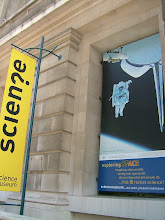Speculating about the Universe as a quantum fluid
By Chris Lee | Last updated January 25, 2010 9:35 PM
NASA
The first thing that struck me about Hitoshi Murayama was that he certainly did not fit the stereotype of a Japanese presenter—he's relaxed, eloquent, and clearly very, very excited about his work. He is the head of a new research center in Japan called the Institute for the Physics and Mathematics of the Universe—a purview that allows him to study just about anything. But he's chosen to study everything; Murayama wants to know why there is, in fact, a universe.
Because the Physics@FOM audience comes from a range of backgrounds, Murayama's talk was light on details and strong on providing a flavor of the problem and inspiring the audience. And inspired I was, as he took us on a whirlwind tour of the known Universe, including dark matter and inflation. He wrapped up by going completely off the map with some of the ideas that he has had floating around for some time now.
Murayama proposes that the Universe is, in fact, a quantum fluid, somewhat like a superconductor.
Starting with the energy budget of the Universe, he reminded us that less than five percent of the matter and energy in the Universe is understood, with the remainder being dark energy and dark matter. But, even if we could account for dark matter with a bunch of particles and dark energy was understood, we still wouldn't understand much. For instance, none of this knowledge would help us understand why the various forces behave the way they do.
Along the way, he provided a taste of the evidence for why we believe the things that we do. We know dark matter exists because galaxies don't fly apart, because we find gravity where there is no matter, and, most tellingly, our universe would be smooth and featureless in the absence of dark matter. He showed that, although dark matter allows structures to form, inflation provided the initial changes in density that allowed them to condense.
But, of course, we don't know what dark matter is. Murayama justified the idea that dark matter is almost certainly some sort of weakly interacting massive particle by showing how we account for the dimmest objects in the Universe and simply don't find enough of them. In short, we think that dark matter exists because it is just about impossible to account for all the evidence with any other proposals.
Now, with the LHC online, we should start finding particles that may well be dark matter, and we will soon know if cosmologists were on the right track. And that is kind of exciting: years of speculation and careful modeling about to be properly tested. But, even more exciting, if the LHC does find dark matter candidate particles, cosmologists will be able to claim that we pretty much understand the Universe from 10-10s after the big bang to the present day—a mind-boggling thought.
What really seems to turns Murayama on is the problem of explaining why some forces are long-range and some are short-range. Basically, gravity reaches out over huge distances. Electromagnetism would reach just as far, but because there are both negative and positive charges, forces due to one set of charges tend get screened out by opposite signed charges. This effectively limits the reach of electromagnetic forces. Nevertheless, the fundamental distance scaling for the two forces is the same. The strong and weak nuclear forces are very short range, extending no further than the width of a nucleus.
There is no fundamental reason for why these forces scale differently from gravity and electromagnetism. He proposes that the Universe is, in fact, a quantum fluid, somewhat like a superconductor. How does this work? The analogy with superconductivity is apt because superconductors reject magnetic fields. That is, the charges in a superconductor arrange themselves such that the field lines of a magnetic field get bent around the super-current. Now, imagine sitting in the superconductor, trying to make a magnetic field.
What you would see is that the field was incredibly short-ranged because of the way the field would interact with the surrounding charges. Therein lies the idea. Imagine that the Universe is a quantum fluid that interacts very strongly with the strong force and weak forces, but ignores gravity and electromagnetism. Our knowledge of the four forces allows us to calculate some of the properties that this fluid must have, and, from there, to figure out how much energy is tied up in this fluid.
If you are going to go into debt, you might as well do it properly. If Murayama is right, the current energy of the Universe is short by some 1062 percent of that required to create the fluid during the big bang—that is one hell of a mortgage. As he jokingly pointed out, we are constantly told that deficits are a bad thing, so if his dark field proposal is to become more than an idea, some creative accounting is required.
All in all, a great opening to Physics@FOM.
From:http://arstechnica.com/science/news/2010/01/quantum-universe.ars
2010/08/06
訂閱:
張貼留言 (Atom)









沒有留言:
張貼留言